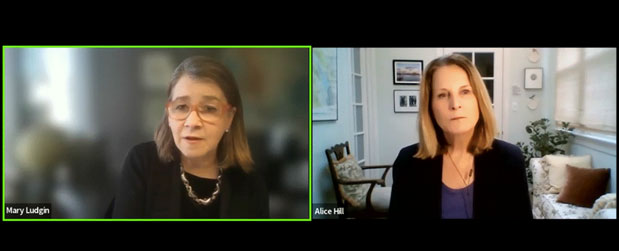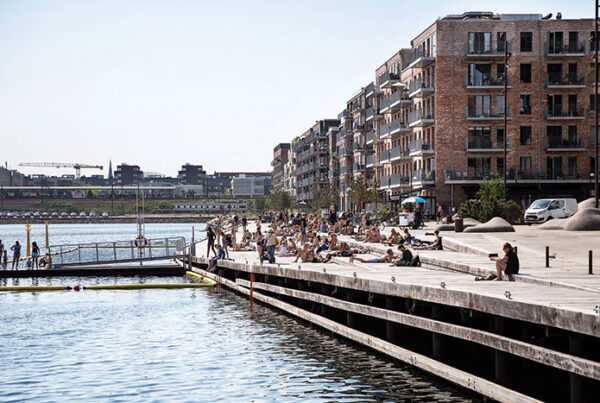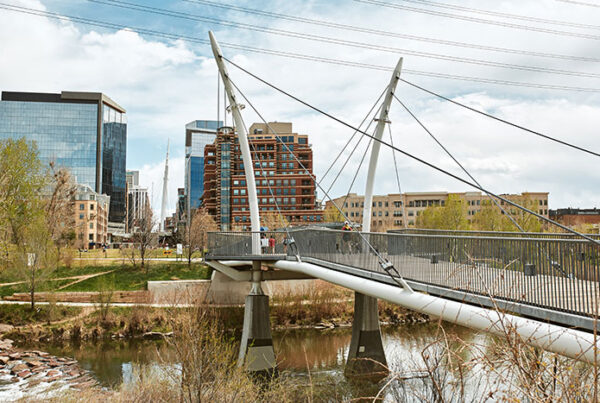
Mary Ludgin (left), senior managing partner and head of research at Heitman, interviews Alice Hill, the David M. Rubenstein senior fellow for energy and the environment at the Council on Foreign Relations, during the 2022 ULI Resilience Summit.
![]() Speaking at the 2022 ULI Resilience Summit, which was held virtually, Alice Hill, the nominee for deputy administrator for resilience at the U.S. Federal Emergency Management Agency, said, “We will need the voices of ULI and other stakeholders to improve decision-making going forward,” when it comes to shaping policy around climate change and the built environment.
Speaking at the 2022 ULI Resilience Summit, which was held virtually, Alice Hill, the nominee for deputy administrator for resilience at the U.S. Federal Emergency Management Agency, said, “We will need the voices of ULI and other stakeholders to improve decision-making going forward,” when it comes to shaping policy around climate change and the built environment.
Hill is currently the David M. Rubenstein senior fellow for energy and the environment at the Council on Foreign Relations, but her formal training was as a prosecutor and then a judge. She was interviewed by Mary Ludgin, senior managing partner and head of research at Heitman.
Hill said when she was first getting involved in climate policy, there was a hesitation to attribute specific weather events to climate change. That has changed, said Hill, with the heat dome that occurred in 2021 in North America as just one example of something that would not have happened without greenhouse gases. Hill said it is also possible that bad actors will be held responsible by the U.S. courts as they were in the production of asbestos and tobacco products.
Hill is also a part of a working group with California’s Department of Insurance which recently issued a report on the availability of fire, flood, and wildfire insurance.
“We’re seeing in California, the affordability and attainability of wildfire insure decreasing. … California is the sixth largest insurance market in the world,” said Hill. “As we see insurers pull back from these markets, what’s going to take their place. We’re seeing the possibility of public markets but there are many tricky issues with government interventions.” Ludgin cited MunichRE research saying 2021 was the fourth most expensive year for climate disasters worldwide.
Hill’s work has also focused on helping the most vulnerable in society and their exposure to climate risk.
“These catastrophic risks … really fall disproportionately on the vulnerable as well as women and young girls,” said Hill. “They are at risk of human trafficking,… Also those suffering from disabilities and discrimination, we have to account for that.”
Hill questioned if society is undervaluing more preparation for communities with lower property values whereas the more affluent communities will have more resources.
Ludgin said that some of the ability to migrate in response to climate change is based on income and wealth. A new ULI report investigates how investors are responding to this possibility.
Hill said that when she first joined the U.S. Department of Homeland Security, she took an interest in the climate migration that was already occurring more than a decade ago, often due to wildfires and other acute weather events driving people from their homes. “With migration we have a choice,” said Hill. “Is it going to be chaotic or are we going to be prepared?”
Hill said that the private markets for insurance could be helpful here. Many Americans ignore evacuation notices for hurricanes, said Hill, but forecast-based insurance would help pay people to board up their homes and get to safety, said Hill, reducing the loss of life and property damage.
Hill said the 2018 Paradise Fire displaced about 20,000 people, many of whom evacuated to nearby Chico, California. This led to affordability issues in the housing market and strains in services such as the public schools.
Hill said that one thing we have learned from 2021 is supply chains are also vulnerable. Hurricane Maria led to the second longest power outage in Puerto Rico’s history, said Hill, which hurt the pharmaceutical industry that was based there, which lead to shortages of medical equipment nationwide.
Hill said during wildfire outbreaks in Australia and North America, the soot and smoke also deprecated the performance of solar power in those regions, leading to further increases in the use of fossil fuels. The interconnectivity of the different systems battling climate change need to be considered as part of planning efforts.
Hill said one of the positives she saw coming out of the United Nations’ COP-26 conference was the focus on reducing methane in the atmosphere. Methane emissions are shorter-lasting than carbon dioxide, said Hill, but concentrated in its impact versus the longer-lasting greenhouse gases.
Hill said that much of climate action needs to be local, as the United States has so many school boards and planning commissions, all of whom need to be thinking about resilience.
Hill said that the real estate industry has a chance to lead here. “No one benefits when communities are wiped out,” said Hill, also noting that for many Americans their home is their most valuable asset.



